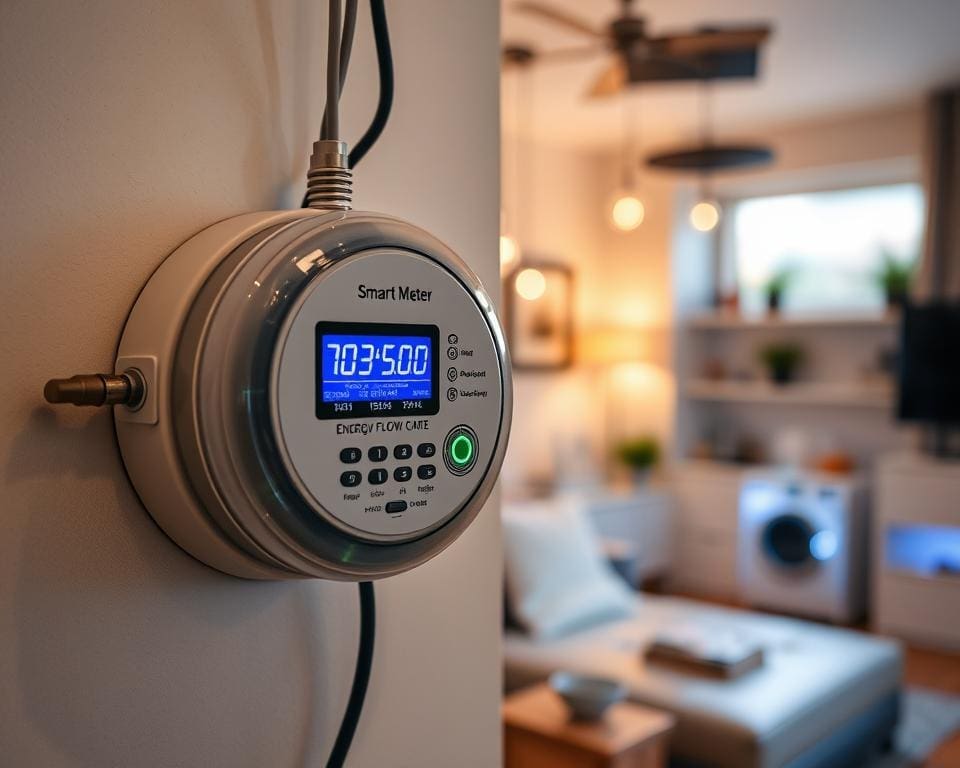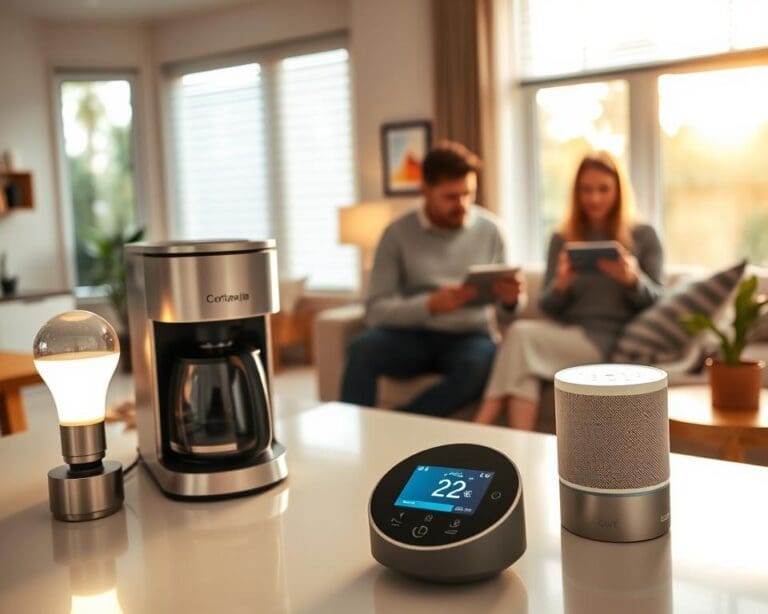The evolution of energy management has taken a significant leap with the introduction of Smart Meters. These revolutionary devices offer a reliable means of energy consumption tracking, providing real-time insights that empower households to make informed decisions about their energy use. In the UK, a growing number of households are experiencing the smart meter benefits that come with enhanced visibility into their energy habits, leading to smarter living through efficient energy management.
Studies indicate that users who adopt smart meters observe noticeable changes in their consumption patterns, ultimately paving the way for reduced expenses and a more sustainable lifestyle. As we delve deeper into the world of smart meters, the journey towards a more efficient and eco-friendly future becomes clearer.
Understanding Smart Meters and Their Functionality
Smart meters represent the next generation of energy consumption measurement, transforming the way households manage their utility usage. These devices incorporate advanced Meter reading technology, enabling precise tracking of energy consumption in real-time. This technological evolution removes the reliance on estimated billing, leading to a more accurate portrayal of energy usage.
By utilising smart meters, consumers gain an instantaneous view of their energy consumption patterns. This feedback empowers users to make informed choices about their energy usage, promoting a greater sense of control over their bills. Increased awareness through smart meter functionality encourages energy-saving behaviours, thereby contributing to more sustainable energy practices.
One of the significant advantages of smart meters lies in their ability to communicate directly with energy suppliers. These meters employ two-way communication systems, which can include GSM or broadband technologies. This connectivity allows for seamless data transmission, ensuring that suppliers have accurate information for billing. With enhanced Smart Meter functionality, both the consumer and the supplier benefit from improved energy management.

Smart Meters: Tracking Your Energy Consumption
Understanding the significance of accurate meter readings is essential for effective energy management. Smart meters play a crucial role in providing precise data, enabling consumers to grasp their energy usage and ensure equitable billing.
The Importance of Accurate Meter Readings
Accurate meter readings form the backbone of transparent energy consumption insights. Traditional billing methods often rely on estimated figures, which can lead to discrepancies and unexpected charges. With smart energy monitoring, real-time data captures actual usage patterns, allowing users to identify usage peaks and adjust their habits accordingly. This level of detail not only enhances billing accuracy but also cultivates a better understanding of personal energy consumption.
How Smart Meter Technology Works
The technology behind smart meters utilises advanced meter reading technology, integrating automated data logging and communication features. These devices connect to dedicated platforms, which present users with a clear view of their consumption trends. By accessing this information through mobile apps or online services, consumers can track their usage minute-by-minute, enabling them to make well-informed decisions that can lead to significant savings. Embracing smart energy monitoring fosters a more sustainable attitude towards energy consumption, encouraging proactive management of resources.
Benefits of Smart Meter Installation
The installation of smart meters provides numerous advantages for consumers keen on optimising their energy consumption. With the capacity for enhanced energy usage analysis, smart meters empower individuals to take control of their energy habits.
Enhanced Energy Usage Analysis
One of the most notable smart meter benefits is the detailed insight it provides into energy patterns. Users can access real-time data regarding their consumption, allowing them to pinpoint peak usage times. This heightened awareness encourages behavioural changes that can lead to reduced energy consumption. Such informed decisions are vital for both personal and environmental goals.
Cost Savings Through Efficient Energy Management
Smart meters play a crucial role in driving smart meter savings. Many consumers have reported significant reductions in their energy bills after switching to smart metering. By analysing energy usage, individuals can implement strategies to lower wastage, thus achieving more efficient energy management. Investing in this technology not only proves beneficial for the pocket but also promotes a more sustainable lifestyle.
Features of Smart Energy Monitoring
Today’s households seek more control over their energy consumption patterns. With the advent of smart energy monitoring, users can access a wealth of information that empowers them to manage their energy use effectively.
Real-Time Data Access
The ability to obtain real-time data access transforms energy management. Users receive instant feedback regarding their energy consumption, enabling them to identify peak usage times and adjust their habits accordingly. Such immediate insights can lead to more informed decisions, ultimately promoting a more sustainable lifestyle.
Customisable Consumption Reports
Another exciting feature is the ability to generate customisable consumption reports. These reports allow users to analyse their energy use in depth, pinpointing which appliances are drawing the most power during specific periods. This detailed evaluation not only highlights opportunities for energy savings but also promotes efficiency improvements, ensuring households operate more economically.
How to Read Your Smart Meter
Understanding how to read smart meters is vital for anyone wishing to take control of their energy consumption. With digital interfaces displaying current usage and trends, these devices provide valuable insights. The more familiar one becomes with the display readings, the better equipped they are to manage energy efficiently.
Understanding Display Readings
Your smart meter’s display offers various readings that are essential for tracking energy use. The most common indicators include:
- Kilowatt-hour (kWh) consumption: This provides a clear picture of how much energy has been used during a specific timeframe.
- Current usage: Instantaneous consumption shows how much energy is being consumed at any given moment.
- Historical data: Many smart meters can display past consumption statistics, facilitating a comparison over different periods.
By regularly checking these display readings, consumers can identify patterns that influence their energy costs.
Interpreting Data Trends
Recognising trends in energy usage is an empowering aspect of using smart meters. By reviewing data over several weeks or months, individuals can:
- Identify peak usage times, allowing for adjustments in energy consumption.
- Spot unusual spikes in usage, which may indicate inefficiencies or appliance issues.
- Establish a baseline for energy consumption, aiding in setting future savings goals.
Learning how to read smart meters enables consumers to become proactive rather than reactive, ultimately leading to more informed energy decisions.
Smart Meters and Sustainability
As the world shifts towards a more eco-conscious mindset, smart meters emerge as crucial tools in the journey toward sustainability. These innovative devices not only empower users to track their energy consumption but also significantly contribute to reducing their carbon footprint.
Reducing Your Carbon Footprint
The implementation of smart meters allows individuals to better understand their energy usage patterns. By recognising peak consumption times and unnecessary waste, users can make informed decisions to lower their carbon footprint. Simple actions such as shifting usage to off-peak times or reducing energy-intensive activities can collectively lead to a substantial decrease in overall emissions.
Promoting Energy Conservation
Smart meters play a vital role in promoting energy conservation through increased awareness. When users receive real-time data on their energy consumption, they are more likely to adopt energy-saving practices. Integrating habits such as turning off appliances when not in use or reducing heating during non-peak hours contributes significantly to sustainability goals across the UK.
Challenges and Concerns with Smart Meters
While smart meters are gaining momentum throughout the UK for their ability to enhance energy management, they are not without their share of challenges. One of the foremost smart meter challenges involves data privacy, as consumers often have valid concerns regarding how their usage data is collected, stored, and protected. With increasing reliance on technology, it is imperative for energy providers to adopt robust data security measures to reassure consumers about the integrity of their information.
Another prevalent issue is the potential for inaccuracies in readings, which can lead to distrust in the system. Although smart meters are designed for precision, malfunctions or communication failures could result in erroneous readings, further fuelling smart meter concerns. It is vital for utility companies to provide transparent information and have responsive support systems in place to address any discrepancies.
Moreover, a degree of scepticism exists among consumers regarding the tangible benefits of smart meters. Many individuals remain unconvinced that these devices will lead to significant savings or behavioural changes. Therefore, educating consumers about the advantages while addressing smart meter challenges is crucial for promoting widespread adoption. By engaging in open dialogue and showcasing the long-term benefits, energy providers can foster acceptance and elevate the effectiveness of smart meter technology across the UK.








